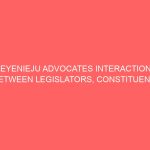- To register illegal refineries’ operators
- PTDF to facilitate Maritime Varsity take-off
The protracted crisis in the Niger Delta region may soon come to an end. The Federal Government has overhauled its approach to quelling the crisis and restoring lasting peace in the region.
Instead of the present combatant approach where the military and other security agencies harass, detain and sometimes kill suspected militants and other troublemakers, the Muhammadu Buhari administration has opted for full-scale dialogue and integration of all stakeholders into the implementation of development programmes in the region.
The Presidency will soon unveil a new roadmap which will enable the people to become key actors in the development of the oil-rich area.
Under the roadmap, the Presidency wants former militants’ leaders and host communities to be considered in the awards of contracts for the protection of oil and gas pipelines.
The new arrangement, which insiders who are privy to it described as a “bumper package,” is aimed at accelerating the return of peace to the troubled Niger Delta region and ensuring steady oil production.
One of the key aspects of the roadmap is the planned recognition of operators of illegal refineries who will be registered and allocated crude oil to process.
It was learnt that the roadmap is a product of Vice President Yemi Osinbajo’s region-wide consultations with stakeholders during his recent tour of states in the Niger Delta on how to stop the restiveness in the region.

A credible Presidency source said that “on the cards are the renewal and re-award of existing oil pipeline protection contracts, possibly to militant leaders; overhaul of the Presidential Amnesty Programme, and the immediate take-off of the controversial National Maritime University, Okerenkoko, in Gbaramatu, Delta State.”
The source said that the Federal Government is considering the vexatious issue of pipeline protection contracts, which were handled by key militant leaders under the administration of former President Goodluck Jonathan, which President Buhari terminated when he assumed office in 2015.
The official explained that in a bid to ensure peace, the Presidency has directed the Ministry of Petroleum Resources to review the pipeline protection contracts to ensure that the host communities are incorporated.
He said that the marching orders have been given to agencies saddled with strategic tasks on the development of the Niger Delta to make the people lay down their arms and join the government to rebuild the region.
According to the official, an implementation planning meeting was held last week in the Presidency where some ministers and relevant Ministries, Departments and Agencies (MDAs) drafted measures that will ensure the immediate takeoff of the programmes designed to transform the region.
On the Maritime University, the Federal Government, according to another Presidency source, has activated the process for the a smooth take-off of the institution, with the Petroleum Trust Development Fund (PTDF) as the lead agency in the implementation of the plan.
He said: “In this regard, the Federal Government is considering the release of a substantial take-off grant for the university while awaiting the conclusion of legislation on its establishment by the National Assembly.
“The Federal Government is also seeking international collaboration with universities across the world for the commencement of academic programmes in the school.”
“The Presidency has directed the Ministry of Petroleum Resources in conjunction with the Petroleum Trust Development Fund and other stakeholders to come up with a proposal for an effective funding model for the university”.
“The Presidency has also directed the Niger Delta Development Commission (NDDC) to liaise with the relevant agencies and organisations to facilitate the construction of an access road that will pass through Escravos to the university in Gbaramatu”.
On the registration of illegal refineries’ owners so that they can be converted to modular refineries, the source said the administration was considering securing crude for them to refine under certain conditions.
He said: “The modular refinery initiative of the administration will be private sector-driven and will entail independent indigenous oil producers working with oil-producing communities to formalise the process of converting illegal refineries in their domains into legal entities that would be run in collaboration with the government.
“Under the new arrangement, the Federal Government is considering a situation where operators of illegal refineries will legally receive crude at reasonable rates for refining while modalities will be worked out for them to register such refineries as legal entities”.
The Presidency source further said that, “under the new plan, operators of such illegal refineries could become shareholders with additional investments made in their businesses.”
It was learned that the Presidency has directed the Ministry of Petroleum Resources, as the anchor of the modular refinery initiative, to work in conjunction with the NDDC and state governments in the region to actualise the goal.
The source added that the NDDC has been mandated to work with other agencies to organise modular refinery operators into cooperatives to enable them access funds and related support from the relevant authorities.










